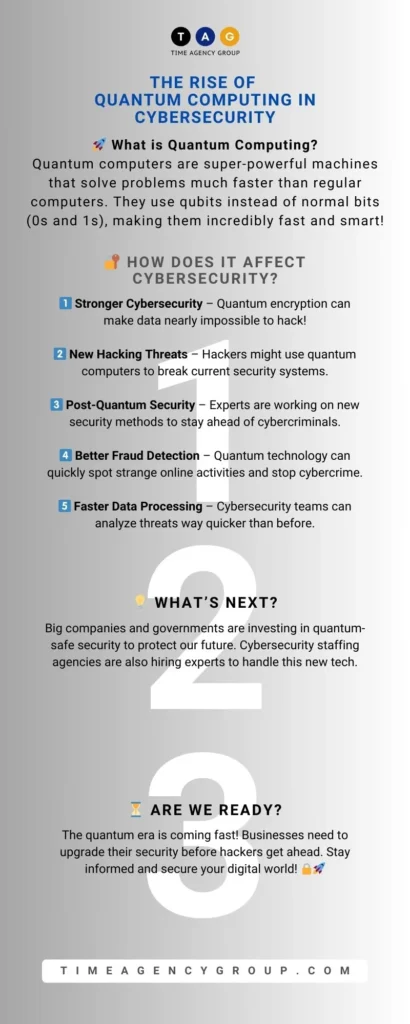The field of quantum computing is in the middle of a rapid revolutionary process and its consequences for cybersecurity are promising. As well as, nerve-racking to talk about the benefits of a quantum computer, it will be their capability to develop stronger encryption algorithms. Thus, it is an obstacle for hackers not to access personal and business data.
Nevertheless, they might also break into the existing encryption protocols. As quantum research is flourishing, cybersecurity professionals are devising new means to protect user data from future security issues that would make the digital world quite risky – all this aims to create a safe digital world for everybody.
Quantum Computing: A Brief Overview
Quantum computing is a huge improvement from classical computing. This is because quantum computers are constructed using quantum bits (qubits) instead of binary bits (0s and 1s), which are used by classical computers to process data. Qubits, which are the building blocks of quantum computers, are being used to perform complex mathematical operations at speeds considerably faster than those achievable with traditional digital machines. These are the potential safety risks that come with the amazing prowess of quantum computing devices.
How Quantum Computing Impacts Cyber Security?
As we all know, the potential of quantum computers to revolutionize and bring Cyber Security to a new level. Here’s a quick overview of quantum computing’s Impact on cybersecurity:
Stronger Encryption
Quantum computers could offer solutions to produce very strong encryption methods to protect data and enable limited hacker access. These encryption techniques would be more secure and difficult for classical computers to crack. This potentially offers better protection for sensitive data.
Breaking Current Encryption
However, on the other hand, quantum computers would also be able to break through the various encryption methods. But, we are currently using, such as RSA and ECC. The methods heavily focus on the difficulty of factoring large numbers. Quantum computers could do much faster than today’s computers, making our current security systems less safe.
New Security Measures
As quantum computers invade the scene, cybersecurity professionals are crafting what they call “quantum-safe” algorithms. These are the new techniques of encoding that could quantum attacks and ensure that the security systems are safe, even in the quantum era.
To sum up, the pros and cons of quantum computing for computer security cannot be debated. In its application, it should use the power to regulate and protect data. It does promise a higher level of security with the new encryption but at the same time. It opens up the risk of jeopardizing existing systems, which eventually leads to the development of new, quantum-resistant security measures.
The Future of Quantum Computing in Cybersecurity
Quantum computing is only available to the selected group of research universities and government offices, and only a few major scientific companies are researching it. Nevertheless, this work at the digital interface of quantum computing with cryptographic technology is moving at an incredible pace.
One of the big challenges is the “quantum-classical gap” as classical error correction techniques can not be directly applied to quantum circuits. In this fast-moving area, we still have a few years to prepare and secure our infrastructure before we will see massive usage. On the contrary, the quantum protocol Elliptic Curve Cryptography(ECC) is characterized by ambiguous use of page numbers which makes it difficult for an adversary to intercept the message.
One of the alternatives to prevent hackers and ensure data privacy is through the use of post-quantum cryptography. Old school cryptographers, who are already crying in their beds, have recognized that this is the end of their world. One of the frequently used early algorithms like RSA from 1978 and ECC in 1985 will not be secure in the post-quantum cryptographic era, using very few qubits.
Conclusion
The journey into the quantum computing era is not only delightful but also terrifying. The ability of quantum computers to solve complex problems may result in revolutionizing advancements in diverse fields. Nevertheless, cybersecurity triggers stressful competition among software developers to invent. And its place paradigms whose quantum resilience will be ensured. Taking into consideration the innovations, our perseverance and versatility will render us successful in this epoch of computing.
FAQs
Will quantum computers be able to break existing security systems?
Yes, quantum computers can handle these problems much faster, therefore, it is more convenient for hackers to access protected data.
Can quantum computers improve cybersecurity?
Yes, quantum computers would bring about some of the encryption measures being used today being made obsolete due to the development of algorithms making it easier to solve these problems thereby a fall in cost and time for hackers to break into a system.
Unlock the future: Explore quantum computing’s impact on cybersecurity! As quantum technology advances, it presents both challenges and breakthroughs that are revolutionizing data protection. Cybersecurity staffing agencies play a crucial role in preparing organizations for this transformation by providing top talent equipped to tackle emerging threats. Stay ahead of the curve and discover how quantum computing is reshaping secure communication. Act now—learn, innovate, and secure your future in the quantum era!
Infographic







